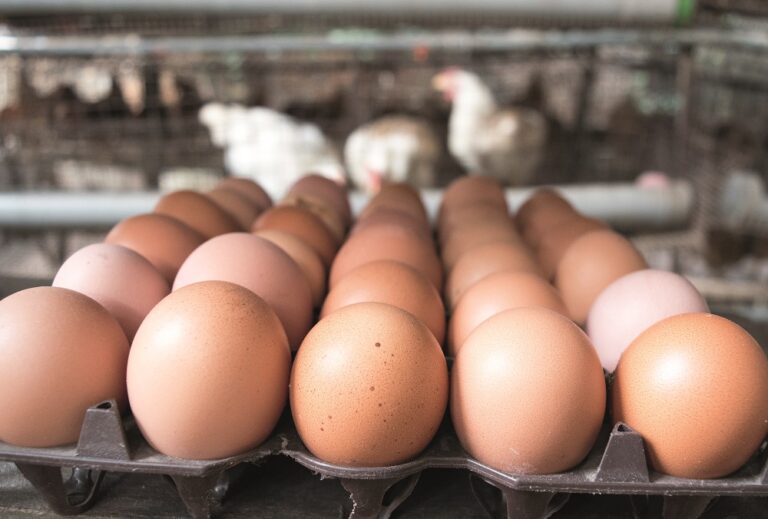The UK poultry meat sector will be protected with a variety of tariffs but egg imports will be subject to no tariffs in the event of a no-deal Brexit, according to the latest government advice published today. Other agricultural products have been offered protection in the form of tariffs, including beef and sheepmeat, which the NFU has previously warned would be particularly vulnerable to cheap foreign imports should no tariffs be applied.
The tariffs on poultry meat vary according to the cut, but range from 11.3% for frozen backs to 50.1% on fresh and frozen cuts of turkey, to 78.1% on brined poultry meat. The full list of tariffs can be found here https://www.gov.uk/government/publications/temporary-rates-of-customs-duty-on-imports-after-eu-exit?utm_source=c5494e88-bc5d-4fe7-8271-d7a30ad0a315&utm_medium=email&utm_campaign=govuk-notifications&utm_content=immediate
Responding to the publication of the Government’s import tariff schedule in the event of a no-deal Brexit, NFU President Minette Batters said: “While we are relieved that we are finally able to see the tariffs that will be applied on imported food in a ‘no-deal’ scenario, it is appalling that we only now have this opportunity to do so – a fortnight before they could come into effect. Farmers and food businesses have no time to prepare for the implications, which will be exacerbated by the fact that we will face tariffs on our own exports on food into the EU and other countries with whom we currently enjoy free trade arrangements.
“Although we are pleased to see that the government has listened to our concerns and elected to treat many agricultural sectors sensitively, which may support farmers who are already facing disastrous disruption from no-deal, it is enormously worrying that some sectors will not have this protection – noticeably eggs, cereals, fruit and vegetables.
“Even those sectors that are treated sensitively will, in most instances, see worrying and large reductions in the tariff rates currently charged on non-EU imports. Furthermore, the approach taken by the government to lump products under the same high-level tariff code, for example whole carcases and high value cuts of fresh beef, means there is a high chance of market distortion for many sectors who are deemed to have been treated sensitively.
“We recognise the importance of ensuring food prices for consumers do not rise in a no-deal Brexit but we are deeply concerned that the approach to tariffs published today will mean a greater reliance on food produced overseas. This would not necessarily lead to cheaper food for consumers but would mean we export and increase the environmental impact of our food production while losing control of the high standards of animal welfare to which that food is produced. In a no-deal scenario the government must act immediately to revise these tariffs and quotas should this happen.
“But more importantly, the publication of this tariff is another example of how British farming will be damaged by a no-deal Brexit. No-deal must be taken off the table and a workable solution identified by MPs and government as a matter of urgency that takes us into an orderly Brexit.”
The British Poultry Council welcomes the Government’s temporary tariff regime for no-deal Brexit but calls on parliamentarians to take action to prevent the UK from leaving the EU with no-deal to ensure affordability and availability of British food.
BPC Chief Executive, Richard Griffiths, said: “We welcome Government’s recognition of the importance of British poultry meat production in feeding the nation and the need to protect it during a period of extreme change. The BPC is currently assessing the impact of the proposed no-deal tariffs published by the Government this morning and will be raising its concerns over the application of these tariffs around the Northern Ireland border.
Today, we’re calling on parliamentarians to take action to prevent the UK from leaving the EU with no-deal to ensure affordability and availability of British food. A no-deal Brexit would be incredibly damaging for our sector, for our ability to trade, for our workforce and for British consumers of poultry meat. We directly employ 40,200 people up and down the country, 60% of our workforce are EU nationals. Britain could risk losing the EU nationals employed by our sector, the £5.1bn Gross Value Added we contribute to the economy and the £1bn in tax revenue we generate.
Almost three quarters of our imports (£2bn/year) and exports (£500m/year) are with the EU – ensuring a continuation of trade with that market is essential. We are concerned that leaving with no-deal could effectively result in the import of products produced to lower standards; and in export tariffs being imposed on poultry meat that goes to the EU (27% increase on chicken).
In the event of a no-deal Brexit, there will be increases in the costs of production which would be reflected in the price of fresh UK chicken. We estimate in the worst case no-deal scenario, the price of breast meat could rise by 25%.
If the Government is serious about making Brexit work, then it must avoid running the risk of creating a two-tier food system where only the affluent can afford to eat British poultry that meets British standards from farm to fork. It’s crucial that the UK finds a workable trade deal with the EU and gives our sector access to non-UK labour.”


